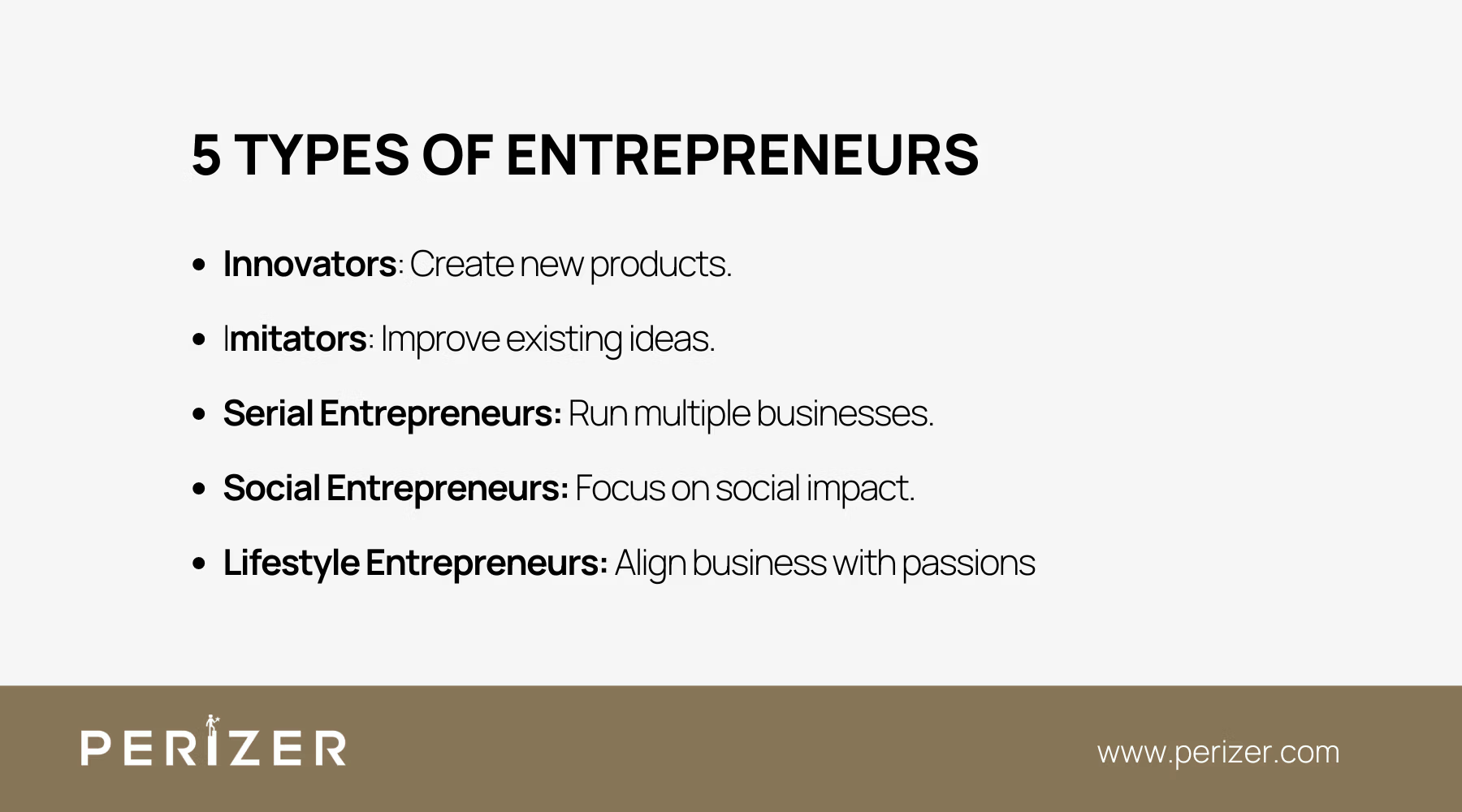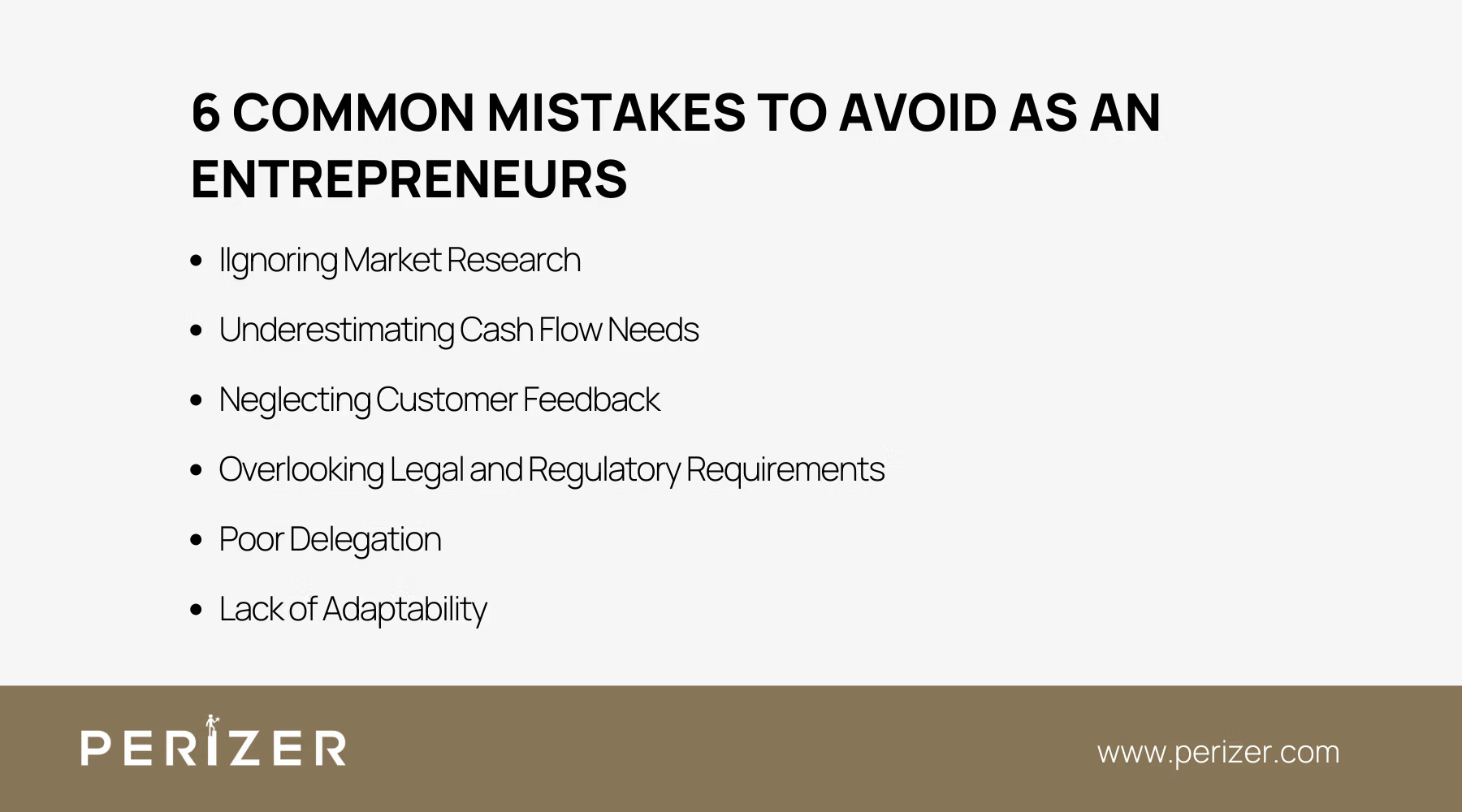10 Characteristics for Becoming a Successful Entrepreneur
Explore the 10 key traits of successful entrepreneurs. Learn how to apply them to elevate your business and achieve extraordinary success.

Becoming a successful entrepreneur involves more than just having a great idea. It requires a combination of key traits and skills that help you turn your vision into reality. From being able to think ahead and plan strategically, to staying strong in the face of challenges, these characteristics are essential for building and growing a thriving business.
These traits not only help you manage the complexities of the business world but also enable you to capitalize on opportunities and adapt to changes. By mastering these characteristics, you can build a strong foundation for long-term success and make a meaningful impact in your industry.
In this article, we will discuss the various types of entrepreneurs and examine the 10 essential characteristics that define successful ones.
Five Types of Entrepreneurs

1. Innovators
Innovators are entrepreneurs who focus on developing new products, services, or technologies. They excel at identifying gaps in the market and coming up with novel solutions. If you identify as an innovator, your strength lies in your ability to think outside the box and bring groundbreaking ideas to life. To maximize this trait, stay curious, invest in research and development, and continuously seek ways to push the boundaries of your industry.
2. Imitators
Unlike innovators, imitators focus on improving and refining existing ideas. They excel at identifying successful business models and improving them for better market fit. As an imitator, your role is to study what works well and find ways to make it even better. Develop a keen eye for existing market trends and think about how you can add value or improve upon them.
3. Serial Entreprenurs
Serial entrepreneurs are individuals who start and run multiple businesses, often simultaneously. They are skilled in recognizing and taking advantage of new opportunities, and they often have a portfolio of ventures. If you’re a serial entrepreneur, manage your ventures by prioritizing and delegating effectively. Balance is key, so ensure you have the right team and systems in place to handle multiple projects.
4. Social Entrepreneurs
Social entrepreneurs are driven by a mission to address social, environmental, or community issues. They emphasize creating a positive impact over making a profit. If you’re a social entrepreneur, focus on understanding the issues you want to handle and develop a sustainable model that aligns with your values. Measure success not just in financial terms but also by the social impact you create.
5. Lifestyle Entrepreneurs
Lifestyle entrepreneurs build businesses that align with their interests and desired lifestyle. They emphasize work-life balance and personal satisfaction over aggressive growth. If you identify as a lifestyle entrepreneur, choose business ventures that support your passions and provide you with the flexibility you need. Ensure your business model allows you to maintain the balance you seek.
10 Characteristics for Becoming a Successful Entrepreneur

1. Visionary Thinking
Successful entrepreneurs are always skilled at imagining the future and setting ambitious goals. They don't just react to current trends but predict future market shifts and opportunities. By creating and executing a strategic plan aligned with their vision, they drive their business toward innovation and growth. Staying proactive and adaptable ensures that their vision remains relevant and achievable as the market evolves.
2. Resilience
Resilience is important for overcoming the frequent challenges and obstacles in entrepreneurship. Entrepreneurs with strong resilience see obstacles as opportunities for growth rather than failures. They employ effective coping strategies, such as stress management techniques and seeking guidance from mentors, to stay grounded. Accepting change and adapting quickly enables them to recover from difficulties and maintain their progress.
3. Decisiveness
Decisiveness is important for making impactful and timely business decisions. Entrepreneurs must analyze information, assess risks, and make confident choices that propel their business forward. Quick and effective decision-making helps them capitalize on opportunities and address issues before they intensify. Practicing decisiveness keeps the business dynamic and responsive to changes.
4. Effective Communication
Effective communication is fundamental for successful entrepreneurship. Entrepreneurs need to convey their vision clearly, negotiate effectively, and lead their teams with precision. Strong communication builds trust and collaboration among stakeholders, ensuring alignment with business goals. Active listening and clear feedback help build strong relationships and drive the business toward success.
5. Financial Expertise
Financial expertise is essential for managing and growing a business effectively. Entrepreneurs with strong financial skills can budget wisely, forecast accurately, and analyze financial performance to make the best decisions. Monitoring cash flow and maintaining financial health are crucial for long-term sustainability. Financial expertise supports strategic planning and ensures that the business remains on solid ground.
6. Networking Skills
Networking skills are important for expanding professional connections and accessing new opportunities. Entrepreneurs actively build relationships with industry peers, mentors, and potential partners. Effective networking opens doors to collaborations, insights, and resources that contribute to business growth. Cultivating a strong network provides valuable support and opportunities for advancement.
7. Strategic Planning
Strategic planning involves setting clear objectives and creating actionable plans to achieve them. Entrepreneurs who excel in this area regularly review and adjust their strategies based on performance and market trends. Strategic planning ensures the business adapts to changes and remains on a path to success.
8. Customer Focus
A strong focus on customers is important for business success. Entrepreneurs who deeply understand their customers' needs and preferences can customize their offerings to meet those demands. By actively seeking and incorporatingcustomer feedback, they improve satisfaction and build loyalty. This customer-centric approach drives business success and builds lasting relationships.
9. Leadership Skills
Effective leadership is key to guiding and motivating a team toward achieving business objectives. Entrepreneurs with strong leadership skills set clear expectations, provide constructive feedback, and build a positive work environment. This Inspires and empower team members and also improves collaboration and productivity. This contributes to overall business success.
10. Innovation and Creativity
Innovation and creativity drive business differentiation and growth. Entrepreneurs who accept new ideas and approaches explore novel solutions and technologies. By continuously seeking innovative ways to improve and adapt, they maintain a competitive advantage and stay relevant in their industry. Building a culture of innovation ensures the business evolves and thrives.
6 Common Mistakes to Avoid as an Entrepreneur

1. Ignoring Market Research
Failing to conduct thorough market research can lead to misguided decisions and missed opportunities. To avoid this mistake, invest time in understanding your target market, including customer needs, preferences, and behaviors.
Use surveys, interviews, and industry reports to gather relevant data. Analyze competitors to identify gaps and opportunities in the market. Regularly update your research to stay informed about changing trends and ensure your business strategies remain aligned with market demands.
2. Underestimating Cash Flow Needs
Mismanaging cash flow is a critical error that can endanger your business. Ensure you have a clear understanding of your cash flow requirements by creating detailed financial projections and budgets. Monitor your cash flow regularly to track income and expenses. Implement strategies for managing cash flow, such as maintaining a reserve fund, optimizing inventory levels, and negotiating favorable payment terms with suppliers. Regularly review and adjust your financial plans to address any cash flow issues proactively.
3. Neglecting Customer Feedback
Ignoring customer feedback can result in missed opportunities for improvement and reduced customer satisfaction. Actively seek and value feedback from your customers through surveys, reviews, and direct interactions. Use this feedback to identify areas for improvement and make necessary adjustments to your products or services. Engage with customers to address their concerns and demonstrate that their input is valued. Continuously improving based on customer feedback helps improve your offerings and build stronger customer relationships.
4. Overlooking Legal and Regulatory Requirements
Failing to address legal and regulatory requirements can lead to costly fines and legal issues. Ensure you are aware of and comply with all relevant laws and regulations in your industry. This includes business registration, licensing, intellectual property rights, and tax obligations. Consult with legal professionals to ensure that your business practices are compliant and to address any legal concerns. Regularly review and update your legal knowledge to stay informed about changes in regulations that may impact your business.
5. Poor Delegation
Micromanaging and failing to delegate tasks effectively can delay your business growth and lead to burnout. Develop strong delegation skills by identifying tasks that can be handled by others and assigning them to capable team members. Provide clear instructions and the necessary resources for successful task completion. Trust your team to take ownership of their responsibilities and avoid the temptation to intervene in every detail. Effective delegation allows you to focus on strategic activities and fosters a more productive and empowered team.
6. Lack of Adaptability
Sticking rigidly to a plan without adapting to changing circumstances can be harmful to your business. Cultivate adaptability by staying informed about industry trends, market shifts, and emerging technologies. Be willing to pivot your strategies and business model in response to new information or changing conditions. Encourage a culture of flexibility within your team and remain open to experimenting with new approaches. Adopting adaptability helps you manage challenges and take advantage of opportunities as they arise.

How to Improve Your Entrepreneurial Skills
1. Continuous Learning
To stay ahead in entrepreneurship, commit to lifelong learning. Regularly seek out new knowledge through books, online courses, workshops, and industry conferences. Focus on areas relevant to your business, such as leadership, financial management, and marketing. By continuously expanding your knowledge base, you stay updated on industry trends and best practices. This improves your ability to make informed decisions and innovate effectively.
2. Seek Feedback and Mentorship
Actively seek feedback from peers, mentors, and advisors to gain valuable insights into your performance and areas for improvement. Engage with experienced entrepreneurs who can offer guidance and share their experiences. Mentorship provides an opportunity to learn from others' successes and failures, helping you avoid common pitfalls and develop effective strategies. Be open to constructive criticism and use it to refine your skills and approaches.
3. Practice Goal Setting and Planning
Set clear, achievable goals and develop a strategic plan to reach them. Break down long-term objectives into smaller, manageable milestones, and create actionable steps to achieve each one. Regularly review and adjust your goals based on performance and changing conditions. Effective goal setting and planning help you stay focused, track progress, and ensure that your efforts align with your business vision.
4. Improve Problem-Solving Skills
Develop your problem-solving abilities by tackling real-world challenges and seeking innovative solutions. Approach problems with a critical mindset and analyze potential causes and effects. Encourage creative thinking within your team and explore multiple perspectives to find effective solutions. Practicing problem-solving in various scenarios builds your ability to handle complex issues and make strategic decisions under pressure.
5. Build Strong Networking Connections
Expand your professional network by actively participating in industry events, joining business associations, and connecting with other entrepreneurs. Networking provides opportunities for collaboration, learning, and business growth. Engage in meaningful conversations, share your experiences, and offer support to others in your network. Building strong relationships can lead to valuable partnerships, insights, and opportunities that improve your entrepreneurial skills.
6. Develop Leadership and Team Management Abilities
Strengthen your leadership skills by focusing on team management, motivation, and communication. Set clear expectations, provide regular feedback, and build a positive work environment. Invest in developing your team members’ skills and encourage their professional growth. Effective leadership ensures that your team remains engaged and productive, contributing to the overall success of your business.
7. Adopt a Growth Mindset
Adopt a growth mindset by viewing challenges and obstacles as opportunities for learning and development. Cultivate resilience by staying positive and persistent in the face of difficulties. Encourage yourself and your team to continuously improve and seek new ways to improve performance. A growth mindset helps you adapt to changes, overcome obstacles, and maintain a forward-looking perspective.
8. Use Technology and Tools
Utilize technology and tools to streamline your business processes and improve efficiency. Invest in software solutions for project management, financial tracking, and customer relationship management. Stay informed about new technologies and trends that can benefit your business. Using technology allows you to optimize operations, make evidence-based decisions, and stay competitive in a rapidly evolving market.
9. Improve Time Management
Effective time management is important for balancing various responsibilities and priorities. Use techniques such as categorizing, scheduling, and delegation to manage your time efficiently. Identify and eliminate time-wasting activities and focus on tasks that contribute to your business goals. improving your time management skills helps you stay organized, meet deadlines, and maintain productivity.
10. Build Creativity and Innovation
Encourage creativity within yourself and your team by creating an environment that supports experimentation and new ideas. Stay curious and open to exploring different approaches and solutions. Allocate resources for research and development and invest in creative thinking exercises. Building a culture of innovation helps you stay ahead of competitors and continuously improve your products, services, and business strategies.
Conclusion
Becoming a successful entrepreneur requires more than just ambition; it demands a combination of key characteristics, skills, and strategies. By understanding and developing traits such as visionary thinking, determination, and financial knowledge, you can position yourself for success in the competitive business world.
Avoid common pitfalls, continuously improve your skills, and remain adaptable to changing conditions. Approach the journey of entrepreneurship with a proactive mindset, and you’ll be well-equipped to turn your business aspirations into reality.
FOCUSED, FAST, GOVERNMENT READY
Stay Tuned With Our Latest Insights

Staff Augmentation
Learn how to select the perfect IT outsourcing partner to promote your team’s capabilities, improve productivity, and drRead more...

Staff Augmentation
Find the perfect staff augmentation partner by aligning your goals, evaluating expertise, managing costs, and ensuring aRead more...

Cyber Security
We focus on understanding the needs, behaviors, and expectations of your users through extensive user research. This infRead more...